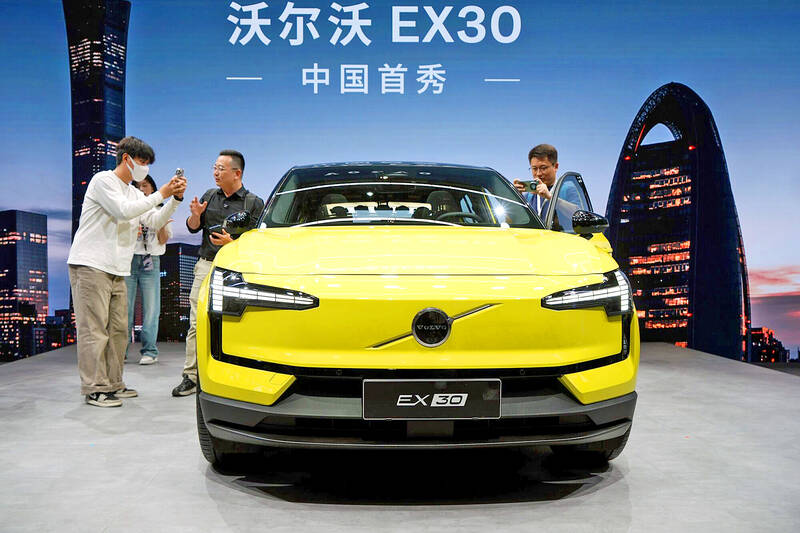Volvo Car AB has started to shift manufacturing of Chinese-made electric vehicles (EVs) to Belgium as the EU prepares to impose tariffs on China-made EVs, the Times reported.
On top of transferring production of Volvo’s EX30 and EX90 models to Belgium, the automaker might also move assembly of some Volvo models bound for the UK, the report said, citing unidentified people.
Volvo, which is owned by Zhejiang Geely Holding Group Co (吉利控股集團), is seen as the most exposed among western automakers to the potential tariffs, the Times said.

Photo: Bloomberg
Trade frictions between the EU and China have led to a barrage of anti-dumping probes against Beijing amid allegations of unfair subsidies.
The EU is expected to tell EV makers in China as early as next week whether it would impose provisional tariffs from July 4 that would boost import duties above the current level of 10 percent.
China last week accused the EU of working to “suppress” Chinese companies and has signaled it is ready to unleash retaliatory duties on EU-made vehicles with large engines, a move that would hit Germany’s Mercedes-Benz AG, Porsche AG and BMW AG the most.
Meanwhile, Turkey is to raise tariffs on all vehicle purchases from China by 40 percent, in a bid to curb imports and narrow the current account deficit.
The tariff imposed would be a minimum of US$7,000, according to a presidential decision published in the Official Gazette. The decision would be effective after 30 days.
Turkey raised customs duty on Chinese EVs last year to support the country’s first domestically produced EV.
However, German Chancellor Olaf Scholz spoke out against restricting automotive trade as the EU moves closer to slapping tariffs on EVs imported from China.
Germany’s auto industry is benefiting from business in China and would be able to compete with the Asian country’s automakers if trade remains “fair and free,” Scholz said on Saturday.
“Isolation and illegal customs barriers — that ultimately just makes everything more expensive, and everyone poorer,” Scholz said at an event organized by Stellantis NV’s Opel in Ruesselsheim, Germany. “We do not close our markets to foreign companies, because we do not want that for our companies either.”
Germany’s powerful auto industry has pushed back against tariffs, saying its business with China secures jobs at home.
An escalating trade spat would fuel inflation and delay the transition to a cleaner economy, former Volkswagen AG CEO Herbert Diess said earlier this month.
Scholz said that the industry should continue shifting to battery power to ensure it would remain competitive in the years to come.
“Doubting progress, delaying renewal and transformation — that would have bitter consequences,” he said. “If we do that, others will overtake us.”

TAKING STOCK: A Taiwanese cookware firm in Vietnam urged customers to assess inventory or place orders early so shipments can reach the US while tariffs are paused Taiwanese businesses in Vietnam are exploring alternatives after the White House imposed a 46 percent import duty on Vietnamese goods, following US President Donald Trump’s announcement of “reciprocal” tariffs on the US’ trading partners. Lo Shih-liang (羅世良), chairman of Brico Industry Co (裕茂工業), a Taiwanese company that manufactures cast iron cookware and stove components in Vietnam, said that more than 40 percent of his business was tied to the US market, describing the constant US policy shifts as an emotional roller coaster. “I work during the day and stay up all night watching the news. I’ve been following US news until 3am

UNCERTAINTY: Innolux activated a stringent supply chain management mechanism, as it did during the COVID-19 pandemic, to ensure optimal inventory levels for customers Flat-panel display makers AUO Corp (友達) and Innolux Corp (群創) yesterday said that about 12 to 20 percent of their display business is at risk of potential US tariffs and that they would relocate production or shipment destinations to mitigate the levies’ effects. US tariffs would have a direct impact of US$200 million on AUO’s revenue, company chairman Paul Peng (彭雙浪) told reporters on the sidelines of the Touch Taiwan trade show in Taipei yesterday. That would make up about 12 percent of the company’s overall revenue. To cope with the tariff uncertainty, AUO plans to allocate its production to manufacturing facilities in

COLLABORATION: Given Taiwan’s key position in global supply chains, the US firm is discussing strategies with local partners and clients to deal with global uncertainties Advanced Micro Devices Inc (AMD) yesterday said it is meeting with local ecosystem partners, including Taiwan Semiconductor Manufacturing Co (TSMC, 台積電), to discuss strategies, including long-term manufacturing, to navigate uncertainties such as US tariffs, as Taiwan occupies an important position in global supply chains. AMD chief executive officer Lisa Su (蘇姿丰) told reporters that Taiwan is an important part of the chip designer’s ecosystem and she is discussing with partners and customers in Taiwan to forge strong collaborations on different areas during this critical period. AMD has just become the first artificial-intelligence (AI) server chip customer of TSMC to utilize its advanced

Six years ago, LVMH’s billionaire CEO Bernard Arnault and US President Donald Trump cut the blue ribbon on a factory in rural Texas that would make designer handbags for Louis Vuitton, one of the world’s best-known luxury brands. However, since the high-profile opening, the factory has faced a host of problems limiting production, 11 former Louis Vuitton employees said. The site has consistently ranked among the worst-performing for Louis Vuitton globally, “significantly” underperforming other facilities, said three former Louis Vuitton workers and a senior industry source, who cited internal rankings shared with staff. The plant’s problems — which have not